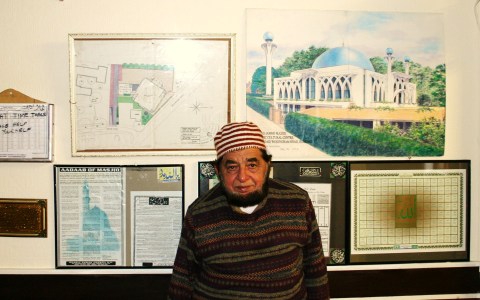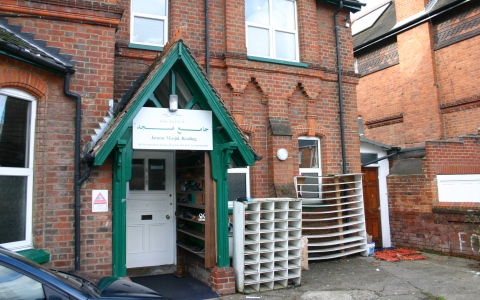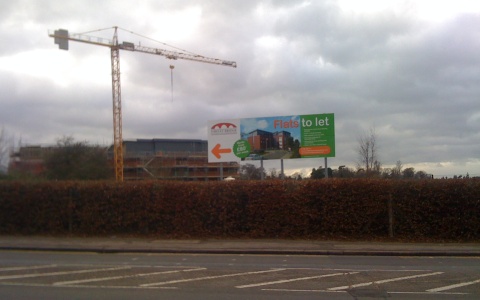UK: How a goodwill offer of land for a new mosque turned sour
by - 13th February 2013

Tablighi Jamaat Muslims are threatening to take an English council to court over a land deal for a prestige new mosque, in a case that illustrates the perils of state involvement in religion.
Reading Council gave Jamme Masjid, who are part of the worldwide Tablighi Jamaat (TJ) mission movement, a 125-year lease on an acre of land in 2009 at a peppercorn rent on condition it be used for all the Muslim community.
Three years later, without a stone being laid, the project is mired in controversy after ‘the community’ fell out.
The rumpus started last July when an opposition Muslim group, the sufi-oriented or Barelvi Reading Islamic Centre (RIC), complained to the Council that the trustees of the new mosque, who are TJ Deobandi, were breaking their agreement to provide a space open to all Reading’s Muslims.
Reading Council have rescinded the deal doubting whether ‘the current group will fulfil the agreement they had with the Council for wider community use.’
They are themselves now taking legal advice.

Before things turned sour, Reading’s Muslims prayed together at a small house mosque in town, but violent clashes led to the founding of a Barelvi breakaway group, the RIC.
In Pakistan this distinction has led to a state of almost war between those who adhere to more traditional mystical practices such as saint veneration, and those who belong to Wahhabi-style reform movements.
Saudi money
Now Saudi money has been implicated in the breakdown of the community project.
The Saudis, who spend considerable sums worldwide ensuring that their interpretation of Islam becomes the mainstream, had offered to fund Reading’s new mosque building.
However, they insisted that Jamme Masjid must own the site outright – rather than lease it, even at a peppercorn rent, from the city of Reading.
Unable to receive the funds, and facing waning support from ‘the community’, the project faltered.
Reading’s Coalition administration agreed to rally to the Saudi offer, by offering to sell Jamme Masjid the freehold of the land, subject to similar conditions, for the sum of £150,000. That was at a Cabinet meeting on 11April 2011.
When the Labour Party was returned to power just months later, however, they immediately started receiving complaints from the Barelvi group that Jamme Masjid was a ‘closed circle’ that was failing to represent ‘all Reading’s Muslims.’
The RIC group publicly contended that the majority of the Muslim community were against the new freehold agreement. They put in an alternate bid for the site to the tune of £170,000. The offer was rejected.
On 16July last year the Council rescinded their offer to sell. A council spokesperson stated: ‘The council is looking to discuss how we can fulfil the objective for wider community use.’
Social engineering
Evidence is mounting that Reading’s embattled Muslims are struggling to maintain a front of unity to conform to requirements – or lose the project.
Every Muslim Lapido spoke to stressed their unity above all else, sometimes denying any sectarian division completely.
Jamme Masjid trustee Bashir Choudri said the Barelvi group had exaggerated divisions in the community in order to derail the project.
He stressed Jamme Masjid’s openness and downplayed religious differences. ‘They [the Barelvis] sometimes have a few minutes’ difference in prayer times, but this doesn’t have to be a problem.’
And yet, Jamme Masjid’s response to the council’s withdrawal of the freehold was a solicitor’s letter that argued that there are irreconcilable differences between the Deobandi and Barelvi rituals, and that the mosque could not be shared.

Choudri floundered whilst trying to explain the division: ‘To me it is because of ignorance. They don’t study our religion properly.’
Looking genuinely distressed, he said: ‘I know what will happen. It is an old story. I don’t want this old story, fighting kids and all this trouble.’
An expert source who wishes to remain anonymous suggested Reading Council had engaged in ‘social engineering’.
The way out of the impasse might be for the council to facilitate access to cheap land for all Reading’s religious groups, he said, but that might open them up to applications for support from other religious groups, including Plymouth Brethren, Jains and Jehovah’s Witnesses.
FACTBOX
Deobandi/Barelvi
Since it’s founding in the nineteenth century, the Deobandi movement has sought to resuscitate a classical Muslim identity in the face of colonial power, Hindu nationalism, and secularism. Like fellow salafis in the Middle East, the Deobandis try to remove any non-Islamic elements from their faith. In south Asia this has meant a virulent, sometimes violent, opposition to the veneration of saints’ tombs. Over half the Islamic colleges in Britain are Deobandi.
Barelvi Islam, also hailing from India, is a stronghold of pre-modern Sunni orthodoxy. It has arisen directly in opposition to reform movements such as the Deoband school. It sticks to traditional south Asian sufi practices such as building on saints’ tombs and praying for intercession. In Britain, Barelvis make up the second most dominant group, although they are losing significant ground due to Saudi funding and South Asian reformists such as Tablighi Jamaat.
Tablighi Jamaat
Jamme Masjid is closely allied to international missionary movement Tablighi Jamaat. TJ is a Deobandi offshoot that tries to reinforce the faith of lapsed Muslims. It adheres to a conservative salafi interpretation of what it means to be a Muslim. They encourage Islamic dress for men and the full veil for women. They are currently contesting a mosque site in Newham, east London, as an international mission base, plans for which were unanimously rejected at a planning meeting before Christmas.
- Log in to post comments
